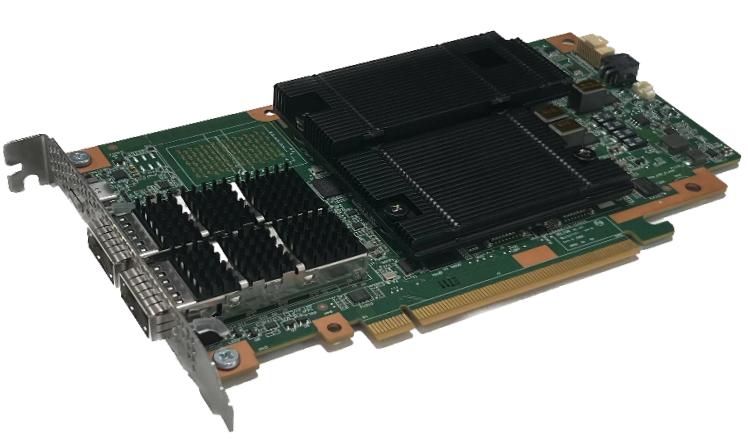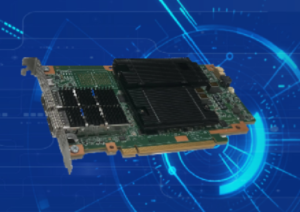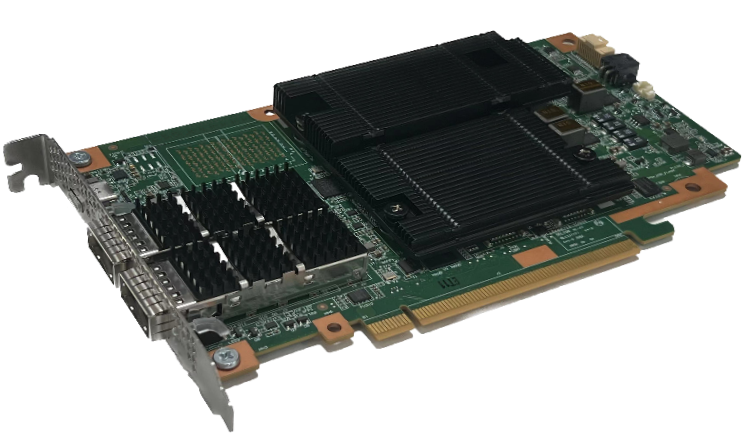Orca-R2100
Orca-R2100, a compact RDMA SmartNIC with two 100G ports, ensures high performance and low latency for HPC, big data, and cloud applications, featuring multi-process isolation, programmable MTT caches, and RoCEv2 support with a 70W power consumption.

Overview
Orca-R2100 is an RDMA smart NIC with independent intellectual property rights, supporting two 100G data networks ports, supporting RoCEv2 large-scale network deployment, it has a hardware engine to handle RDMA operations, which can achieve high performance, low latency, and low CPU overhead in network data transmission, and is usually used in high-performance computing (HPC), big data analysis, cloud computing, and distributed storage systems and other scenarios with very high network performance requirements.
Features
The Orca-R2100 RDMA SmartNIC features high performance, ultra-low latency, and ultra-high reliability.
- Excellent interactive performance
- Supports multi-process isolated, independent, and protected access to NIC hardware resources
- FW interacts with the host through Command Queue to process non-I/O commands, providing high flexibility
and control - FW manages programmable MTT caches and can flexibly formulate MTT cache policies based on scenarios
to improve cache performance
- Excellent hardware performance
- Supports up to 20K QP
- All hardware processes WQE、RoCEv2 protocols:low latency and high throughput
- Fast WQE support:Greatly reduces latency at low loads
- Congestion control algorithm:The hardware supports EC or RTT-based congestion control algorithm to achieve fair bandwidth allocation, fast rate convergence and ultra-high network link utilization
Hardware Specification
| R2100 Hardware Specifications | ||
|---|---|---|
| Physical form | Full-height, single-width, three-quarter-length PCIe card | |
| Memory | FPGA DDR4 particle surface mounting supporting 8GB capacity | |
| PCIe interface | PCIe Gen 4 x16 | |
| Network interfaces | 2x QSFP28 100G Ethernet interfaces | |
| Storage interfaces | 2Gb FPGA QSPI Flash | |
| Debug Interfaces | USB Type-C port | |
| Operating temperature | -10-65℃ | |
| Power consumption | Typical power consumption is 70W | |

Functional Specifications
| Classify | Specification | Illustrate |
|---|---|---|
| Network Configuration | 2x 100G | 2x QSFP28 100G Ethernet interfaces |
| Queue Pair | 20K | |
| Retransmission policy | GBN (Go-back-to-N)/SR (Selective Repeat) Retransmission | |
| Transfer mode | RC (Reliable Connection)/UD (Unreliable Datagram) | |
| Network configuration | Full support for full RDMA Send/Read/Write/Acknowledge operations | |
| SRQ | Shared Receive Queue is supported | |
| Flow Control | PFC/ECN/DCQCN | |
| QoS Priority | Flow Control, RDMA, None RDMA packets are assigned different processing priorities | |
| Memory address type | VA (Virtual Address)/PA (Physical Address) | |
| SGL | Scatter Gather List is supported | |
| RoCE LAG | active-backup (mode 1) | |
| balance-xor (mode 2) | ||
| 802.3ad (LACP) (mode 4) | ||
| Traffic statistics | Supported | |
| Software Configuration | Software | Kernel OFED ib_core |
| Userspace rdma-core | ||
| Verbs | ||
| Software configuration | VLAN configuration of RDMA ports is supported | |
| The MTU configuration of RoCE ports is supported | ||
| User-mode software configuration RDMA,function development, parameters, etc | ||
| Testability | Support standard RPing, Perf-Test tools | |
| RDMA module fault injection is supported | ||
| Exception handling | ||
| RDMA chip fault detection and repair is supported | ||
| Timeout detection when a RoCE connection is abnormal | ||
| Support RDMA chip FW Dump collection | ||
| Performance | Processing Performance | Msg Rate 50 Mpps |
| Delay | 2~3 μs |
Application Scenarios
- HPC/AI large model acceleration scenarios

- Deployment storage acceleration scenarios

Procurement Information

R2100 RDMA SmartNIC
| Serial number | Product Code-PN | Illustrate |
|---|---|---|
| 1 | YSX-R2100-1023 | QSFP28 100Gx2, full height, single width, three-quarter length, 023: version number |